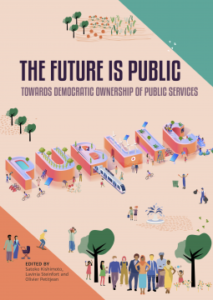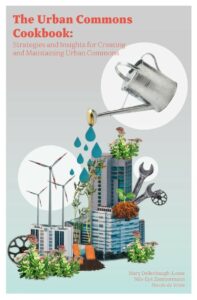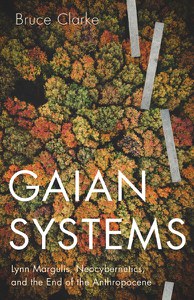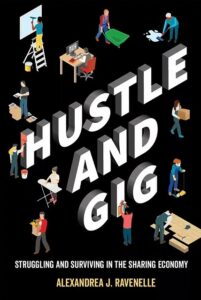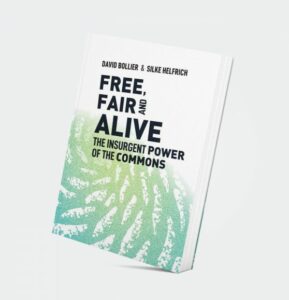If you’ve had to alter your summer plans due to the COVID-19 pandemic or a job change, you’re probably far from alone. Maybe you’re staycationing instead of your normal getaway? Maybe you’re doing some car camping or vacationing semi-locally? Maybe you need to focus on getting that new job or starting a worker co-op? Whatever the case, we hope you find some time to relax and read this summer. That brings us to Shareable’s summer book selections. Each quarter, we round up books that caught our eye or that we’ve published. This summer, we’re pleased to introduce you to our latest free ebook, “Library of Things: A Cornerstone of the Real Sharing Economy,” along with 15 other books.
What books are you reading right now? Let us know at info@shareable.net! Below are summaries excerpted from each book’s website:
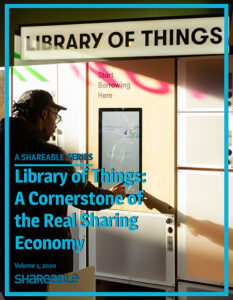 Library of Things: A Cornerstone of the Real Sharing Economy by Shareable
Library of Things: A Cornerstone of the Real Sharing Economy by Shareable
The ebook “Library of Things: A Cornerstone of the Real Sharing Economy” features our editorial series covering the past, present and future of libraries of things.
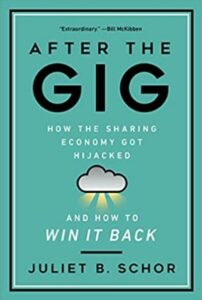 After the Gig: How the Sharing Economy Got Hijacked and How to Win It Back by Juliet Schor (available September 1, 2020)
After the Gig: How the Sharing Economy Got Hijacked and How to Win It Back by Juliet Schor (available September 1, 2020)
When the “sharing economy” launched a decade ago, proponents claimed that it would transform the experience of work—giving earners flexibility, autonomy, and a decent income. It was touted as a cure for social isolation and rampant ecological degradation. But this novel form of work soon sprouted a dark side: exploited Uber drivers, neighborhoods ruined by Airbnb, racial discrimination, and rising carbon emissions. Several of the most prominent platforms are now faced with existential crises as they prioritize growth over fairness and long-term viability.
The Future is Public: Towards Democratic Ownership of Public Services Edited by Satoko Kishimoto, Lavinia Steinfort, and Olivier Petitjean
Resistance to privatisation has turned into a powerful force for change. (Re)municipalisation refers to the reclaiming of public ownership of services as well as the creation of new public services. In recent years, our research has identified more than 1,400 successful (re)municipalisation cases involving more than 2,400 cities in 58 countries around the world. But this book is about more than just numbers. It shows that public services are more important than ever in the face of the climate catastrophe, mounting inequalities, and growing political unrest. Together, civil society organisations, trade unions, and local authorities are crafting new templates for how to expand democratic public ownership to all levels of society and opening up new routes to community-led and climate conscious public services.
 Growing Young by Marta Zaraska
Growing Young by Marta Zaraska
What to do to live long? From fountain-searching Ponce de Leon to pill-popping Silicon valley techies humanity has been trying to pinpoint the answer for centuries, often fixating on all the wrong things: miracle diets, miracle foods, miracle supplements. We skip gluten and invest in exercise gadgets. We swallow vitamins. We obsess about BMI. Yet even though healthy nutrition and physical activity are indeed important for health, there are things that can weight on our centenarian potential even more, things that we all too often sacrifice while we chase fad diets and the newest cardio workouts. Friendships. Purpose in life. Empathy. Kindness. Science shows that these “soft” health drivers are often more powerful than diet and exercise.
Urban Commons Cookbook by Mary Dellenbaugh-Losse, Nils-Eyk Zimmermann, and Nicole de Vries
Which ingredients of a cooperative community project most help it succeed? What are urban commons and how do they fit into current activist and civil society debates? And what tools and methods do commoners need to strengthen their work? These are the three questions at the heart of The Urban Commons Cookbook, a handbook for those interested in starting, growing and supporting community-led projects.
Read more about the Urban Commons Cookbook in our special series.
 Disaster by Choice: How our actions turn natural hazards into catastrophes by Ilan Kelman
Disaster by Choice: How our actions turn natural hazards into catastrophes by Ilan Kelman
This book offers an uncomfortable truth, that the majority of ‘natural disasters’ are created or exacerbated by human choices; Explores how we can and should act to stop people dying when nature unleashes its powers by asking what can be done to prevent or avoid disasters; Considers the social, political, and economic factors involved in our decision making around natural hazards; Encourages readers not to accept the complacent narrative of human helplessness in the face of the power of inevitable natural occurrences; Describes inspiring examples of effective human action that limits damage, such as managing flooding in Toronto and villages in Bangladesh, and wildfire in Colorado.
The Next Great Migration: The Beauty and Terror of Life on the Move by Sonia Shah
The news today is full of stories of dislocated people on the move. Wild species, too, are escaping warming seas and desiccated lands, creeping, swimming, and flying in a mass exodus from their past habitats. News media presents this scrambling of the planet’s migration patterns as unprecedented, provoking fears of the spread of disease and conflict and waves of anxiety across the Western world. On both sides of the Atlantic, experts issue alarmed predictions of millions of invading aliens, unstoppable as an advancing tsunami, and countries respond by electing anti-immigration leaders who slam closed borders that were historically porous.
 Humankind: A Hopeful History by Rutger Bregman
Humankind: A Hopeful History by Rutger Bregman
Humankind: Changing the World One Small Act At a Time by Brad Aronson
Brad Aronson’s life changed in an instant when his wife, Mia, was diagnosed with leukemia. After her diagnosis, Brad spent most of the next two and a half years either by her side as she received treatment or trying to shield their five-year-old son, Jack, from the worst of Mia’s illness. Amid the stress and despair of waiting for the treatment to work, Brad and Mia were met by an outpouring of kindness from friends, family and even complete strangers.
The End of the Mega-Machine by Fabian Scheidler
The End of the Megamachine brings to light the roots of the destructive forces threatening the future of humankind today. While the first part leads us to the very origins of economic, military and ideological power 5000 years ago, the second and key part retraces the formation and expansion of the modern world-system through the last 500 years. Dismantling Western progress mythologies, Scheidler shows how the logics of endless capital accumulation have devastated both human societies and ecosystems from the outset. With the growing instability and looming collapse of the Megamachine in the 21st century new dangers as well as new possibilities for systemic change open up.
Mending Life: A Handbook for Repairing Clothes and Hearts by Nina Montenegro
Mending Life is a beautifully illustrated, practical tool kit for repairing the clothes and belongings we love. It is also an exploration of how mending can be a gently healing practice in our daily lives and a small act of rebellion in a world where many things are discarded without thought. Mending Life encourages us to cherish our things by repairing them rather than discarding them. It also encourages us to change our consumption habits so that with small mends here and there, we extend the life of our garments and other household items. This handbook is for beginners but also offers more advanced techniques to those with some experience in mending.
 A Solution to Homelessness in Your Town: Valley View Senior Housing, Napa County, California by Charles Durrett
A Solution to Homelessness in Your Town: Valley View Senior Housing, Napa County, California by Charles Durrett
Thousands and thousands of people want to address the challenge of homelessness in our day; especially for seniors, especially for homeless Vets. Valley View Senior Housing is one of the most exciting communities in the USA to address and fulfill this burgeoning need. Today, governments know the why; now they can know the how. Homelessness challenges us nation-wide, and its solution can be approached through local governments, as shown here. If you are motivated to get a new affordable housing project built in your locale, A Solution to Homelessness in Your Town: Valley View Senior Housing, Napa County, California, is the place to start.
Gaian Systems by Bruce Clarke
Gaian Systems is a pioneering exploration of the dynamic and complex evolution of Gaia’s many variants, with special attention to Lynn Margulis’s foundational role in these developments. Delving into many issues not previously treated in accounts of Gaia, Bruce Clarke describes the history of a theory that has the potential to help us survive an environmental crisis of our own making.
Hustle and Gig: Struggling and Surviving in the Sharing Economy by Alexandrea J. Ravenelle
Choose your hours, choose your work, be your own boss, control your own income. Welcome to the sharing economy, a nebulous collection of online platforms and apps that promise to transcend capitalism. Supporters argue the gig economy will reverse economic inequality, enhance worker rights, and bring entrepreneurship to the masses. But does it?
 From Here to Equality: Reparations for Black Americans in the Twenty-First Century by William A. Darity
From Here to Equality: Reparations for Black Americans in the Twenty-First Century by William A. Darity
Racism and discrimination have choked economic opportunity for African Americans at nearly every turn. At several historic moments, the trajectory of racial inequality could have been altered dramatically. Perhaps no moment was more opportune than the early days of Reconstruction, when the U.S. government temporarily implemented a major redistribution of land from former slaveholders to the newly emancipated enslaved. But neither Reconstruction nor the New Deal nor the civil rights struggle led to an economically just and fair nation. Today, systematic inequality persists in the form of housing discrimination, unequal education, police brutality, mass incarceration, employment discrimination, and massive wealth and opportunity gaps. Economic data indicates that for every dollar the average white household holds in wealth the average black household possesses a mere ten cents.
Free, Fair, and Alive: The Insurgent Power of the Commons by David Bollier and Silke Helfrich
Free, Fair, and Alive is a penetrating cultural critique, table-pounding political treatise, and practical playbook for “commoning” — free, self-organizing systems ranging from cohousing and agroecology to alternative currencies and open-source everything. It presents a bold and compelling alternative to the dead-end, predatory market-state system.


